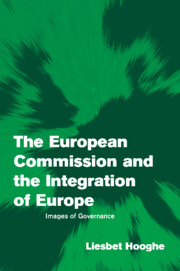Book contents
- Frontmatter
- Contents
- List of figures
- List of tables
- Preface
- Prologue
- 1 Preference formation in the European Commission
- 2 Men (and women) at Europe's helm
- 3 Images of Europe
- 4 Beyond supranational interest
- 5 Capitalism against capitalism
- 6 Principal or agent
- 7 Accommodating national diversity
- 8 Conclusion
- Appendix I Statistics
- Appendix II Description of independent variables
- Appendix III Survey material
- References
- Index
5 - Capitalism against capitalism
Published online by Cambridge University Press: 22 September 2009
- Frontmatter
- Contents
- List of figures
- List of tables
- Preface
- Prologue
- 1 Preference formation in the European Commission
- 2 Men (and women) at Europe's helm
- 3 Images of Europe
- 4 Beyond supranational interest
- 5 Capitalism against capitalism
- 6 Principal or agent
- 7 Accommodating national diversity
- 8 Conclusion
- Appendix I Statistics
- Appendix II Description of independent variables
- Appendix III Survey material
- References
- Index
Summary
In search of market liberals
For a long time, Europe's left was reluctant to support European integration. In its 1952 party program, the German social democratic party castigated supranational Europe as “a conservative and capitalist federation of the miniature Europe” (Haas 1958: 137). It is true that socialist parties in all six founding states helped to ratify the Treaty of Rome, but their support was often qualified – concerned as they were that European economic integration would make it more difficult to pursue socialist policies. Ambivalence or opposition also initially characterized left parties in Britain, Ireland, and Denmark in the 1970s, Greece in the early 1980s, and Sweden in the 1990s. The least one can say is that the left has not been in the vanguard of European integration. The uniting of Europe was crafted by parties of the center and the right (Featherstone 1988: 2).
The left's suspicion was understandable. Until the 1999 Treaty of Amsterdam, there was a powerful institutional bias in EU Treaties and legislation in favor of market-creating (i.e., negative) integration and against market-correcting (i.e., positive) regulation (Dehousse 1992; Majone 1992, 1994a, 1996; Pinder 1968; Scharpf 1996; Streeck 1991, 1996; Streeck and Schmitter 1991). A close examination of the Treaties leads Mark Pollack to conclude that, “from Rome to Maastricht, the fundamental thrust of the treaties has been neo-liberal, in the sense that each of the Community's constitutive treaties facilitated the creation of a unified European market, while setting considerable institutional barriers to the regulation of that same market” (Pollack 1999: 268).
- Type
- Chapter
- Information
- The European Commission and the Integration of EuropeImages of Governance, pp. 118 - 141Publisher: Cambridge University PressPrint publication year: 2002

